People say Wikipedia is fantastic. That it’s a utopia of the world’s knowledge, shared by people who want to educate themselves and others, recognize everyone, and build something beautiful.
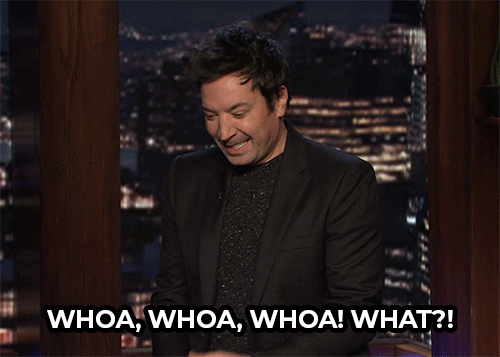
Has that been your experience, or are you one of the people we hear from who say, “But what about the bullies? The editors who seemingly only care about themselves and their own agendas? Am I the only person with this experience?”
Short answer, no, you aren’t alone in feeling blindsided.
Long answer, Wikipedia has a lot of processes, and a lot of editors, and sometimes things get twisted and people get tired and frustrated.

Why does this happen? Let’s take a look, together.
Table of Contents
The Truth About Wikipedia
Wikipedia is a community of millions of editors (Wikipedians) who aren’t located in the same place but still need to collaborate. That is hard, harder than someone working remotely for an employer. An employer has a brand. They have strategic goals that are shared by all employees. Everyone is on the same page.
Wikipedia wants everyone to spread knowledge, but there are no detailed strategic plans to follow for each topic and article. There are guidelines – things like using reliable sourcing and remaining neutral – but even those are open to interpretation. This is necessary because Wikipedia is an open source platform. When you’re collaborating with millions of people and looking at wildly different topics, you can’t have cut-and-dry rules. You need interpretation and discussion and the ability to work slightly differently in each unique situation.
However, while this might be necessary, it does make Wikipedia a complicated place to understand. Truly understanding it, understanding the guiding principles, how to make decisions about them, how to talk to others, and how to edit articles, takes a long, long time.
Some people take this time. Others do not.
This might be because they don’t care, or it might be because they don’t know what they don’t know. What do we mean? Well, if someone has only heard that anyone can edit, and that Wikipedia welcomes all editors, they might not know that they need to take the time to learn and understand some basic guidelines before they start writing.
So, what happens is that the Wikipedians who took the time to learn the rules, who know how much time and practice editing takes, now have people constantly (intentionally or not) “messing up” the encyclopedia.
Wikipedians who feel passionately about Wikipedia articles want them to be reliable and trustworthy. So, when they see editing “done wrong” over and over and over again, they can be curt in their communications. Truthfully, they don’t know if you are one of the Wikipedians who doesn’t care or who is simply confused. Most of these experienced editors don’t at all want to make you feel like you’re bullied. They’re simply trying to fix things, and you might be the twentieth person that day they’ve had to help. They’re cutting to the chase, rather than holding your hand. They’re jaded, and they also might be naturally uninterested in guiding and teaching.
So, while you feel your way forward, it’s important to know what editor types are out there.
Types of Editors You’ll Meet on Wikipedia
There are many, many different types of Wikipedians. Broadly speaking, you have:
- Students – editing as part of a class
- Enthusiasts – people focused on a particular subject
- Insiders – those who work for an organization and want to edit the article about that organization
- Dabblers – editors who go from here to there, looking for any article that needs help
- Scholars – those who are interested in research and want to use Wikipedia as a dissemination platform
- Archivists – Wikipedians who work or volunteer at a museum, archive, or library and want to contribute historical information
- Marketers – editors who want to promote a product, service, or brand
- Evil-doers – spammers, vandals, and those few Wikipedians who actually do want to bully
Most Wikipedians did not wake up wanting to bully. Some might be nicer or more helpful than others, but by and large, they want Wikipedia to be welcoming – but not abused. Likely, this is the type of editor you’ve interacted with, and while your interactions left you feeling less than wholly welcomed, hopefully the editors weren’t malicious.
If they were malicious, you’ve been unlucky enough to cross paths with one of the few Wikipedians who is out for evil.

There are a few especially infamous Wikiepdians who were made to leave the platform. One made it their life mission to delete as many business articles as possible, regardless of whether the articles followed Wikipedia guidelines or not. They did this using the proposed deletion (PROD) process. This process allows an editor to tag an article for deletion. If no one objects within 7 days, the article is reviewed by an administrator. The Wikipedian can delete the article or remove the PROD tag and keep the article active.
The sneaky thing about this is that you have to be actively watching the article to be alerted to the tag. There is no attempt at community discussion. If someone sees the tag, discussion might take place, but that’s a lot of maybes. In the cases associated with this editor, people were not aware and many articles were removed.
Another Wikipedian was downright abusive in their communication. There was no attempt at polite, reasonable conversation. They thought they were always in the right, and they were nasty in how they communicated that belief.
Others, while not as infamous, will comment that whatever you added to an article is wrong, but won’t explain why. Or they might explain why, but continue to delete whatever you add, regardless of how you try to work with them. These are the Stonewallers and the Mess With You Until You Give Up Wikipedians.
If one of these editors crosses your path, you can absolutely reach out and ask for help. Most Wikiepdians genuinely want Wikipedia to be welcoming and respectful. If someone is outright acting in opposition to those values, they will be “caught” and punished. However, even this is going to take discussion and deliberation. Wikipedia is not a dictatorship. Many people have a voice and deliberations do take time.
When you interact with a bully Wikipedian, you are only dealing with an individual (or possibly a small group). While millions of people use Wikipedia and are registered as users, most of them aren’t editing. The top 10,000 users created 68% of the articles on Wikipedia. That’s 10,000 out of 44 million. Wow. To keep going, only the top 0.2% of editors contribute regularly.
That’s an incredibly small group of active editors. Luckily for all of us, that 0.2% does not solely consist of power-hungry bullies, not by a long shot. This means there is hope. We just have to know what to do and where to go.
Help is Available
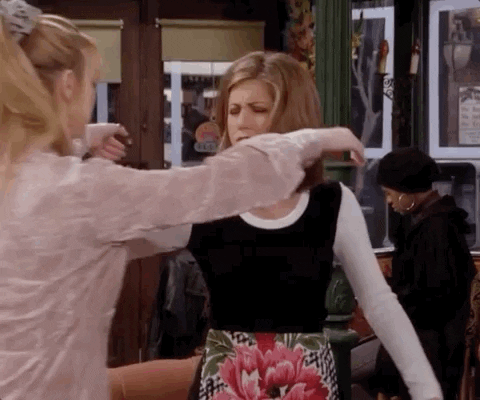
What Type of Editor Do You Want to Be?
First, you need to decide what kind of Wikipedian you want to be, whether you edit one article or a thousand.
We’re sure you want to be everything that you’re hoping to find:
- Polite
- Well-informed
- Courteous
- Genuine in your desire to help share knowledge with the world
Great! How do you do that? Well, you need to be patient, and you need to know the rules and guidelines, your topic, and the history of the article you want to edit. Here are tips to help you.
Be Patient
Wikipedia is an online world. When you start a conversation, you don’t know when someone is going to see your message and have the time to respond. When they do respond, you then have to see their message, and so the cycle continues.
There’s also always the chance that the first user to respond isn’t the one to best help. They might pull in others, or they might bow out and let someone else find you. Try not to get frustrated by this process. Remember, most Wikipedians want the site to be welcoming and not toxic. Help is coming. It just isn’t a 911 call away.
Article Talk Page
If you have questions about a specific article, we recommend asking for help on the talk page of that article. A link to this page is found at the top of every Wikipedia article.

After clicking on the link, you will see a page that looks like this:
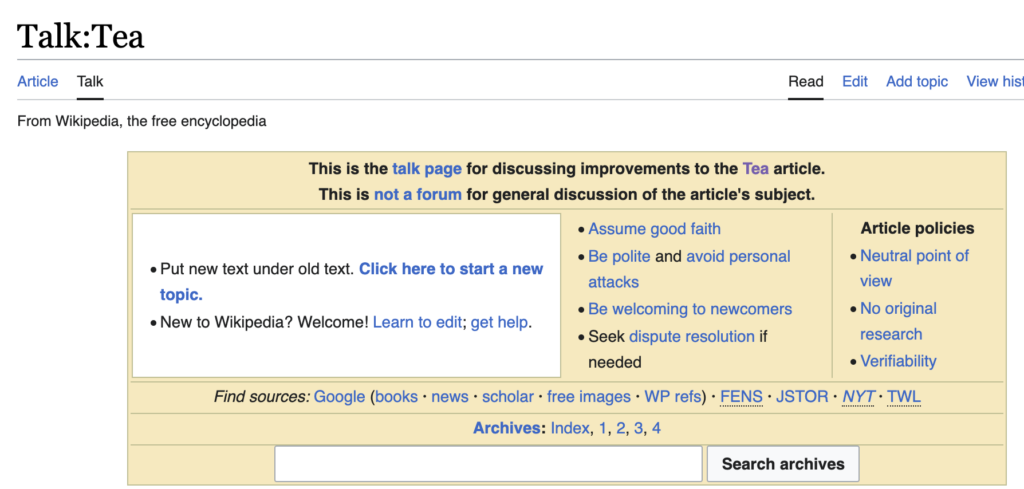
As you can see, there are some helpful links reminding everyone of Wikipedia’s guiding policies: assume good faith, be polite, avoid personal attacks, and be welcoming to newcomers.
There are also article policies. These are content policies that apply to every single article. Following these policies when you draft or edit content is hugely important to show Wikipedia that you are a team player and not the problem. These are: writing from a neutral point of view, making sure everything you draft is verifiable (this requires the use of reliable sources), and not using any original research.
If you haven’t already, familiarize yourself with all of the policies. You don’t have to be an expert, which is good because you won’t be one until you spend a very, very long time on Wikipedia, but you should be aware of the policies. There might be some relevant to your situation that you can reference in your discussion.
Next, read through the existing threads on the talk page. You might find the answers to your question, or you might find an ongoing discussion relevant to you. In that case, you can reply and join that conversation.

If there is no old conversation relevant to your issue, start a new topic.
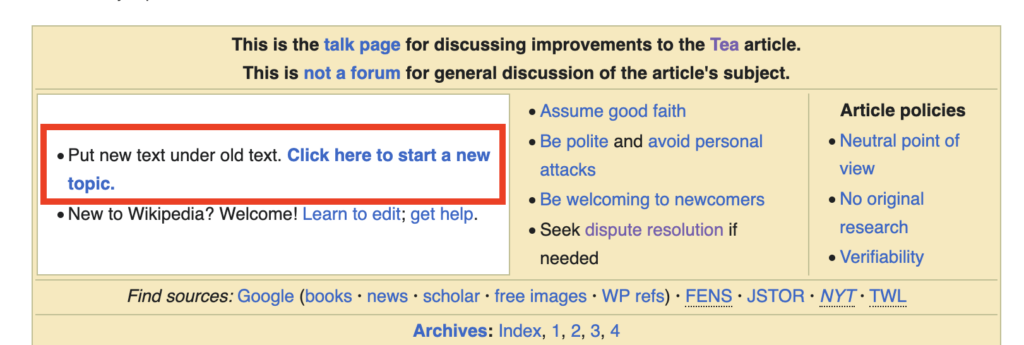
After clicking the link, you will see:
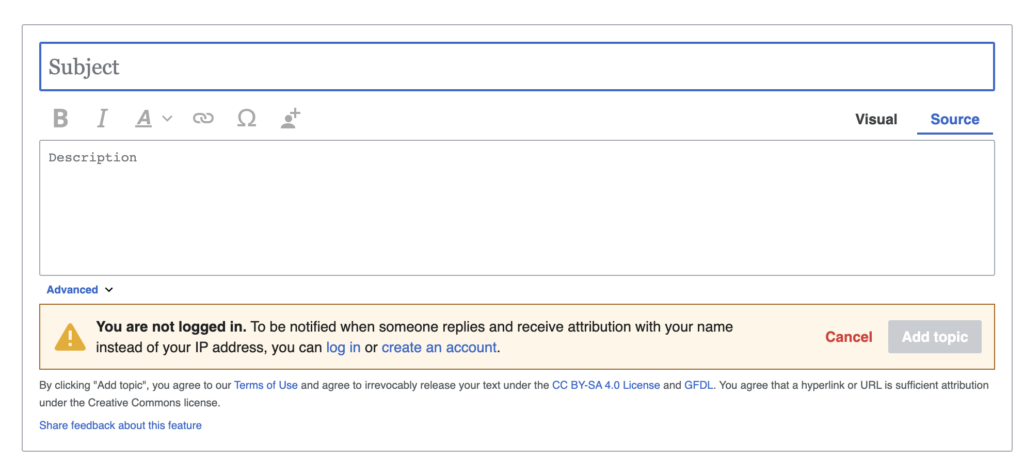
Being as polite and calm as possible, explain your situation and your questions. Share that you want to contribute in a meaningful way to Wikipedia and welcome help. Then, wait and see what happens.
User Talk Page
In some cases, you might want to talk to a specific user. This could be because they’ve been very active on an article and you welcome their help in understanding the article. It might be because they’ve left a few comments for you and you need more information. You should not go to a user talk page looking to start or end a fight. If someone’s been bullying you, stay away from their talk page and use the different community options to get help.
With that said, in good situations, here’s how to leave someone a message on their personal talk page. Take note that like every page on Wikipedia, user talk pages are completely visible to the public. You can’t hide what you post and neither can they.
1. Click on View History

2. Find the user and click on Talk
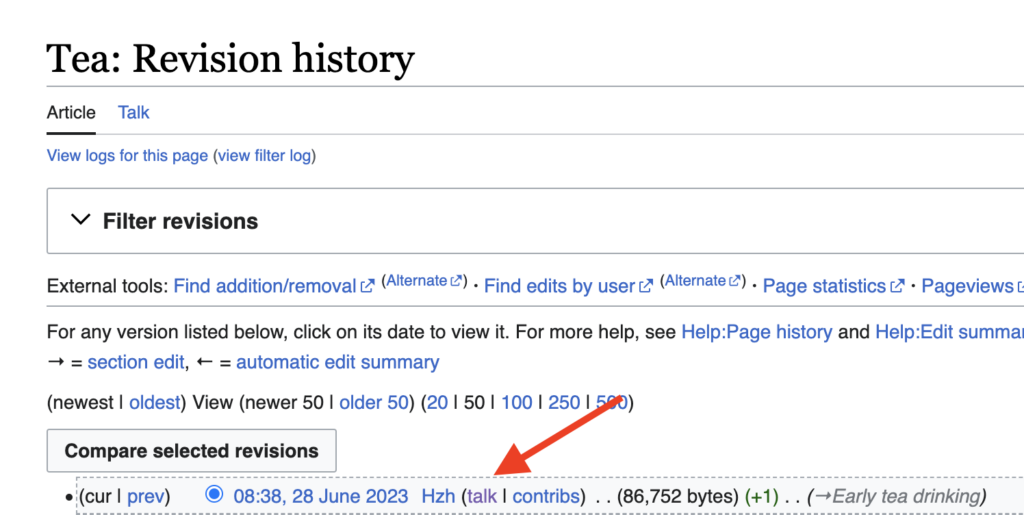
3. Select Add Topic

4. Leave your message
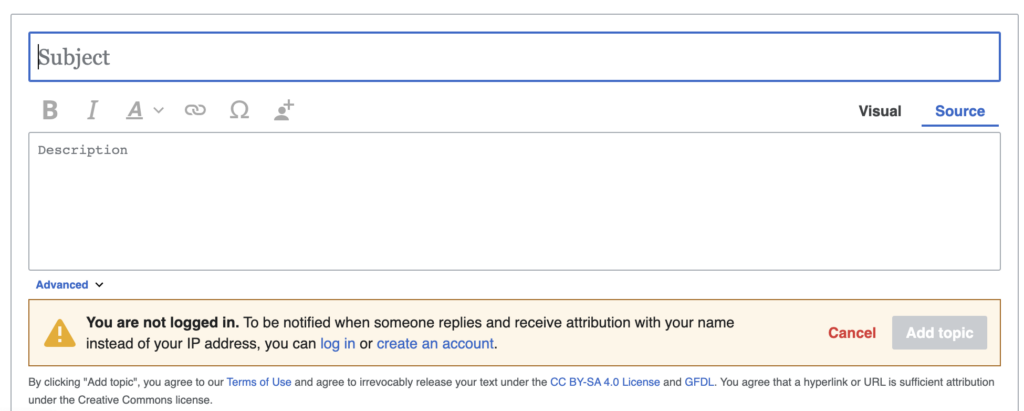
Dispute Resolution
If you visit an article’s talk page, you will see a link for dispute resolution. These resolution methods are only to be used after discussing your issues on the relevant article or user talk page.
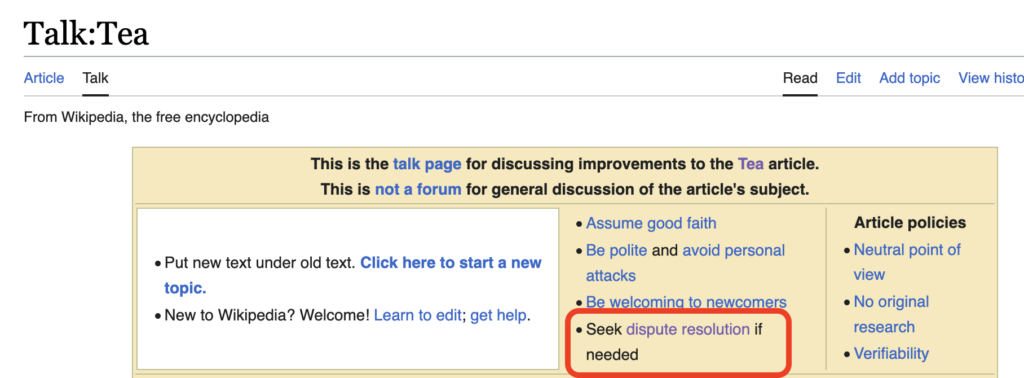

There are dispute resolution options for both article content and user conduct.
The Teahouse
The Teahouse is described as “A friendly place where you can ask questions to get help with using and editing Wikipedia.”
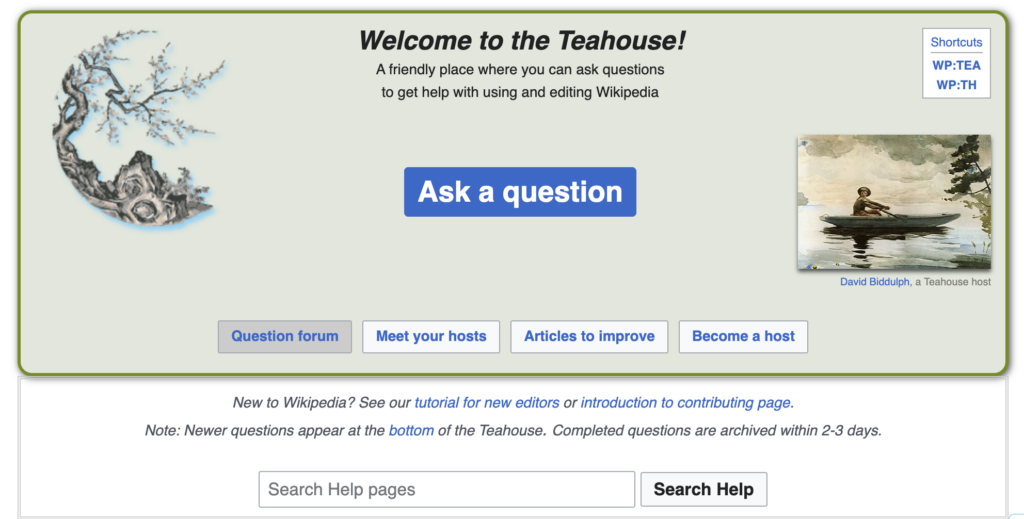
If you look over the page, you can see the current discussions cover a wide range of topics. Some of them have quite a bit of activity, and others none at all.
While reading through these even before asking your own questions might help you learn something – for example, reliable, verifiable sources are the key to everything on Wikipedia – you might also find yourself more confused than when you started. Sadly, this isn’t an uncommon occurrence as Wikipedia is not nearly as straightforward to interact with as people assume. Take heart though, keep asking questions politely, and follow the links and other information people provide. It will take a lot of time, but you will learn.
Conversation one

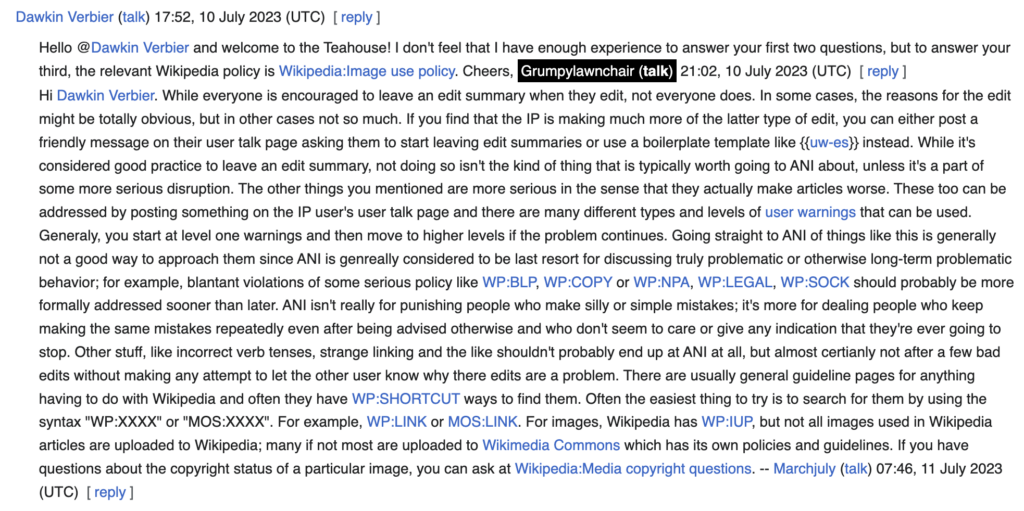
Conversation two

Help desk
The Help desk is another place to ask questions about how to use Wikipedia. You could ask questions about how to use the talk pages and start dispute resolutions, if you wanted.
While the Teahouse and the help desk are very similar, the Teahouse is designed for new editors and is (supposed to be) a friendlier, beginner-focused environment.
Freelance Editor
Another option is to hire a freelance editor to solve your problems for you. After reading through this blog post and seeing how long it takes to find resolution, this might sound pretty attractive. Maybe you don’t have the time and effort to fight your battles or learn all the many ins-and-outs of Wikipedia. Fair enough. However, freelance editors aren’t a perfect choice. Here’s why:
- Wikipedia does not welcome paid editors because of the encyclopedia’s focus on neutral articles.
- Freelance editors might not have the skills and experience that you need, even if they claim them.
- If your problem is very complex, freelancers may not want to stick it out for the long haul.
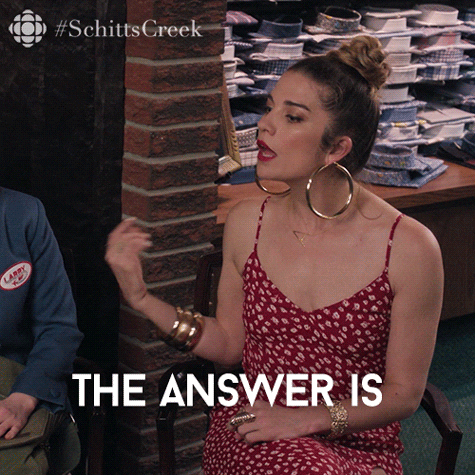
Light at the End of the Tunnel
If you have no other takeaways from this post, remember this: you are not alone. No matter what anyone says, Wikipedia is complex, convoluted, and full of unique users. Don’t let one or two bad apples ruin your day. Take a breath, then reach out to the wider Wikipedia community and start getting the help you need.
If you have any questions about anything in this blog or anything at all related to Wikipedia, let us know. We are always happy to chat.



